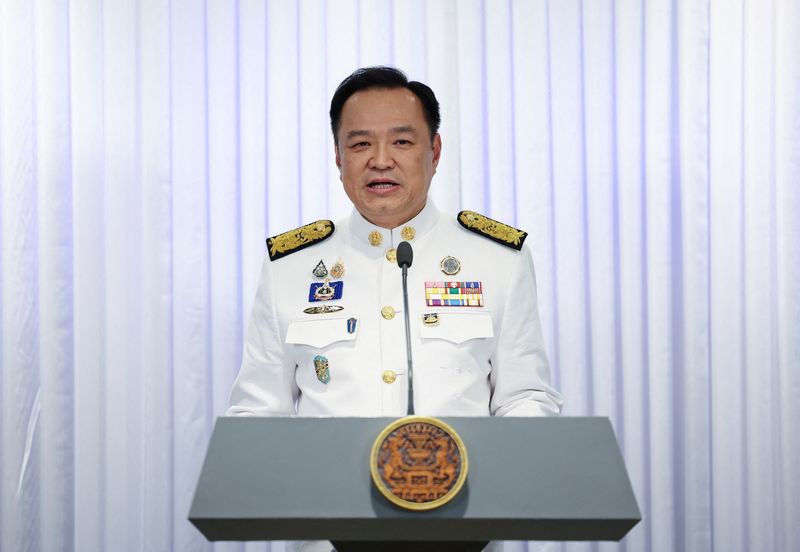By Orathai Sriring and Thanadech Staporncharnchai
BANGKOK (Reuters) -Just days after taking power, Thailand’s Prime Minister Anutin Charnvirakul signalled through his first cabinet appointments an intention to repair a struggling economy and calm simmering border tensions with Cambodia.
Anutin, who won a parliamentary vote on Friday with an overwhelming majority, has only four months in power before calling for an election, as per an agreement between him and the largest party in parliament that backed his premiership bid.
A former interior minister with a reputation as a shrewd operator, Anutin on Saturday named a veteran economist with deep government experience, Ekniti Nitithanprapas, to run the finance ministry and a well-respected former diplomat to lead the foreign ministry.
“It remains to be seen what the PM can do in such a short period of time,” said Lavanya Venkateswaran, Senior ASEAN Economist at OCBC.
“His role will likely be more geared towards setting the stage for the next election.”
Anutin’s administration may push short-term stimulus measures to boost spending and its own standing, three analysts said, including potentially re-packaging projects lined up by the outgoing Pheu Thai government that failed to fire up growth.
Southeast Asia’s second-largest economy is projected to expand by 1.8% to 2.3% this year, according to the state planning agency, and Venkateswaran said growth momentum could slow sharply to 0.5% in the second half of 2025.
Last year, Thailand’s GDP growth of 2.5% lagged its regional peers.
Major drivers of the economy, including the automotive sector and tourism, are under pressure, and government measures such as a stalled cash handout programme have been unsuccessful in triggering a turnaround.
“They need to gain popularity, so they will naturally turn to ultra-populist policies,” said Prakit Siriwattanaket, managing director of Merchant Partners Asset Management.
“Given the short time frame, what else can they do?”
The new administration will likely be supported by another rate cut from the Bank of Thailand when it meets for its next policy review next month, under a new governor, two analysts said.
The central bank could enact a 50 basis point rate cut on October 8, Tim Leelahaphan, senior economist at Standard Chartered Bank, said in a note, “as monetary policy may have to take the lead in supporting the economy.”
CAMBODIA CRISIS
Anutin’s premiership also comes just six weeks after a ceasefire agreement with neighbouring Cambodia, following five days of fighting that killed at least 43 people and temporarily displaced tens of thousands.
A leaked phone call between former Thai premier Paetongtarn Shinawatra and Cambodia’s former leader Hun Sen eventually led to a court decision that dismissed the former, opening the door for Anutin to become prime minister.
On Sunday, the Cambodian prime minister, in a rare overture to the Thai leadership since the conflict, congratulated Anutin on taking office.
“I look forward to working closely with you to restore the relations between Cambodia and Thailand to normalcy, rebuild mutual trust, and transform the shared border,” Hun Manet wrote.
A staunch royalist with strong links to sections of Thailand’s conservative establishment, Anutin will have to balance surging nationalist sentiment at home if he is to mend the relationship with Cambodia.
Sihasak Phuangketkeow, an experienced diplomat who has served as permanent secretary of the foreign ministry, will add ballast to any such move in his new job as foreign minister.
“This government will take peaceful measures to resolve the ongoing Thai-Cambodian dispute with a firm commitment to mitigating any further Thai casualties,” Anutin said in a speech on Sunday.
(Reporting by Orathai Sriring and Thanadech Staporncharnchai; Writing by Devjyot Ghoshal; Editing by Saad Sayeed)








